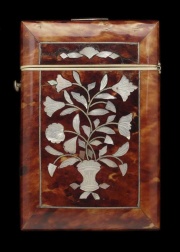Difference between revisions of "Tortoiseshell"
| Line 1: | Line 1: | ||
| − | [[File:17.2233-SC14464.jpg|thumb| | + | [[File:17.2233-SC14464.jpg|thumb|Vessel rattle<br>MFA Acc. #: 17.2233]] |
== Description == | == Description == | ||
A semitransparent, mottled brown material obtained from the protective outer shell on some large marine turtles, especially the hawksbill (''Eretmochelys imbricata''), loggerhead (''Thalassochelys caretta'') and green turtle (''Chelonia mydas''). Tortoiseshell is composed of [[keratin|keratin]], a fibrous protein. It is slightly flexible and can be heated then molded into various shapes. Tortoiseshell has been valued since ancient times when it was used for rings, bracelets, and musical instruments. Later, it was popular as inlay and veneer. Since the 16th century, it was used to decorate European furniture, often in highly decorative inlay patterns. Tortoiseshell has also been used for boxes, combs, brush handles, pocketknives, and jewelry. Because of its expense, imitations were made from stained [[horn|horn]], and later, with early plastics like [[celluloid|celluloid]] or [[casein%20plastic|casein]]. In 1975, the hawksbill and other sea turtles were declared endangered and international trading in modern tortoiseshell became illegal. | A semitransparent, mottled brown material obtained from the protective outer shell on some large marine turtles, especially the hawksbill (''Eretmochelys imbricata''), loggerhead (''Thalassochelys caretta'') and green turtle (''Chelonia mydas''). Tortoiseshell is composed of [[keratin|keratin]], a fibrous protein. It is slightly flexible and can be heated then molded into various shapes. Tortoiseshell has been valued since ancient times when it was used for rings, bracelets, and musical instruments. Later, it was popular as inlay and veneer. Since the 16th century, it was used to decorate European furniture, often in highly decorative inlay patterns. Tortoiseshell has also been used for boxes, combs, brush handles, pocketknives, and jewelry. Because of its expense, imitations were made from stained [[horn|horn]], and later, with early plastics like [[celluloid|celluloid]] or [[casein%20plastic|casein]]. In 1975, the hawksbill and other sea turtles were declared endangered and international trading in modern tortoiseshell became illegal. | ||
| − | [[File:51.302-SC25114.jpg|thumb| | + | [[File:51.302-SC25114.jpg|thumb|Card case<br>MFA Acc. #: 51.302]] |
== Synonyms and Related Terms == | == Synonyms and Related Terms == | ||
Revision as of 10:24, 19 August 2020
Description
A semitransparent, mottled brown material obtained from the protective outer shell on some large marine turtles, especially the hawksbill (Eretmochelys imbricata), loggerhead (Thalassochelys caretta) and green turtle (Chelonia mydas). Tortoiseshell is composed of Keratin, a fibrous protein. It is slightly flexible and can be heated then molded into various shapes. Tortoiseshell has been valued since ancient times when it was used for rings, bracelets, and musical instruments. Later, it was popular as inlay and veneer. Since the 16th century, it was used to decorate European furniture, often in highly decorative inlay patterns. Tortoiseshell has also been used for boxes, combs, brush handles, pocketknives, and jewelry. Because of its expense, imitations were made from stained Horn, and later, with early plastics like Celluloid or casein. In 1975, the hawksbill and other sea turtles were declared endangered and international trading in modern tortoiseshell became illegal.
Synonyms and Related Terms
tortoise shell; tortoise-shell; turtle shell; carapace; hawksbill (Eretmochelys imbricata); loggerhead (Thalassochelys caretta); green turtle (Chelonia mydas)
Risks
Turns gray in strong sunlight. Susceptible to insects damage
Physical and Chemical Properties
- When heated, melts to black mass and smells like burnt hair
- Density = 1.26-1.35
Additional Images
Resources and Citations
- G. Hanlon, "Tortoiseshell", The Dictionary of Art, Grove's Dictionaries Inc., New York, 1996.
- Plastics Museum website
- R.Vuilleumier, "Schildpatt--Verarbeitungstechniken und Imitationen", Maltechnik-Restauro, 85, 1979, p.40-47.
- The Dictionary of Art, Grove's Dictionaries Inc., New York, 1996 Comment: G. Hanlon, "Tortoiseshell"
- A.Lucas, J.R.Harris, Ancient Egyptian Materials and Industries, Edward Arnold Publishers Ltd., London, 4th edition, 1962
- Caring for your Collections, Arthur W Schulz (ed.), Harry N. Abrams, Inc. , New York, 1992
- Oppi Untracht, Jewelry Concepts and Technology, Doubleday & Co., Inc., New York City, 1985
- Jack Odgen, Jewellery of the Ancient World, Rizzoli International Publications Inc., New York City, 1982
- Tom Rowland, Noel Riley, A-Z Guide to Cleaning, Conserving and Repairing Antiques, Constable and Co., Ltd., London, 1981
- Gordon Hanlon, contributed information, 1998
- Random House, Webster's Encyclopedic Unabridged Dictionary of the English Language, Grammercy Book, New York, 1997
- The American Heritage Dictionary or Encarta, via Microsoft Bookshelf 98, Microsoft Corp., 1998






